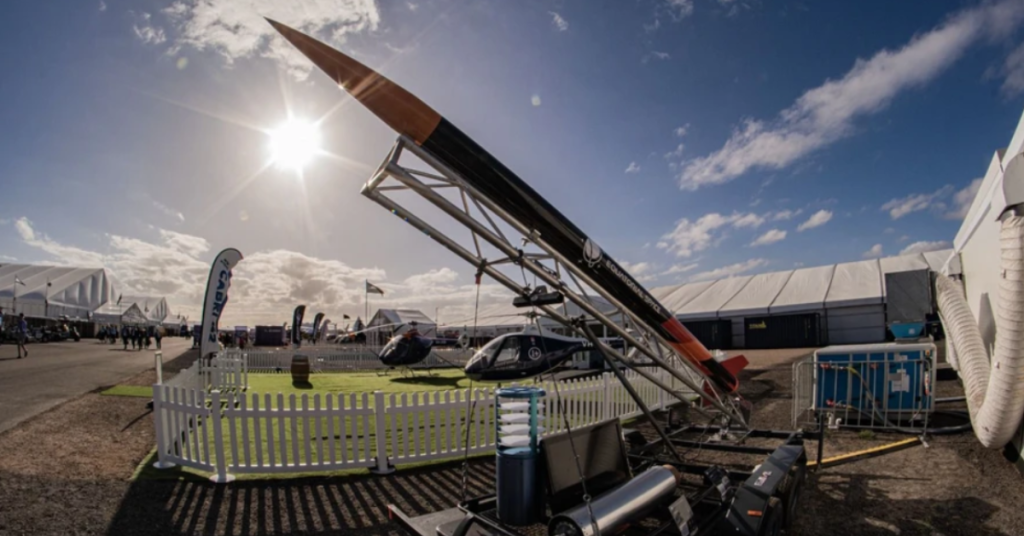The dream of reaching for the stars is something many of us share, some more literally than the rest.
For Simon Gwozdz, Jamie Anderson, and Praveen G. Perumal, though, it’s not just a dream—it’s their reality. They’re the founders of Equatorial Space Systems (ESS), an aerospace startup in Singapore that’s making space access easier (and cheaper) for the masses.
What got them onto our radar (again, as we’ve featured them before here) was the recent news of their pre-Series A round, where they got an investment of S$25,000 by Protégé Ventures.
With this funding, what’s next for the company?

Launching SEA into the space race
“It was always my aspiration to enter the field of space tech and especially launch vehicles but it’s a highly niche industry that is only well established in a handful of places worldwide for a bunch of reasons,” Simon, the CEO of ESS shared.
He realised quickly that to have a shot in the industry, he’d need to create his own opportunities. So in his second year at National University of Singapore (NUS), he took decisive steps to fulfil this ambition.
It wasn’t long before he discovered a breakthrough which would achieve just that—small-scale hybrid propulsion prototypes. These didn’t involve explosives or “ridiculously expensive hardware”, which helped since he was still a student.
As for why Singapore, well, the opportunity presented itself. Southeast Asia had no real commercial push in the aerospace industry and Simon had lived in the country for most of his life.
That’s how ESS started in 2017 under a different name, Equatorial Space Industries (ESI).
When Vulcan Post first spoke to them in 2018, ESI saw the potential for nanosatellites to go mainstream. And the best way to bring this vision to life was to create a cost-efficient, high-frequency solution to nanosatellite launches.
Hence, the idea of hybrid propulsion systems came about and became the startup’s main focus. Fast forward to 2024, and the grassroot initiative has made steady headway in the field.
Fuelling the future with hybrid propulsions
At this point you might be wondering, what the heck are hybrid propulsion systems?
They’re essentially what lifts rockets off the ground. In this case, hybrid refers to the use of liquid oxidiser and solid fuel instead of just either one, which are more traditional.
Without getting into the nitty gritty details, the general idea is that hybrid propulsion systems are safer and not as complex as traditional methods. As such, they’re a more efficient alternative.
“Hybrids have been historically limited because of the performance characteristics and structural behaviour of the solid fuels. That is the challenge that we have resolved with our proprietary solid fuel formulation,” Simon explained.
With ESS’ hybrid solution, the startup is able to compete quite well in the market as it’s roughly a quarter the cost of traditional rockets.
In theory, this hybrid solution can power “the most capable launch vehicles” at a cheaper cost. Simon anticipates that once they leverage the economies of scale, they can bring the cost down to 1/6th of the existing market. Pretty impressive.
Making space access more accessible
Most of ESS’s clients are either testing hardware to iterate new ones quickly, or conducting biochemical and pharmaceutical research. This is called launch services.
Using the startup’s hybrid solution, they’ve proceeded to develop suborbital rockets. These rockets enter space but not to a high enough altitude where they can orbit the Earth.
These industries typically conduct research using launch services to evaluate the interaction between chemicals while eliminating the influence of gravity. This fosters the development of new materials and drugs.
At the moment, Simon explained that it typically takes 18 to 24 months to fully develop rocket parts for satellite use. ESS’s services will bring it down to less than half a year.
“With that, we will be extremely well positioned to become the world’s springboard towards space,” he happily shared.
All of these are just steps towards the startup’s bigger goal—to offer satellite launch services for earth observation using nano satellites, and connectivity like IoT sensor data transfer.
Rocketing to new heights
Although originated from Singapore, ESS today is a global company with facilities, market, and talent pools stretching across the world. Their most recent expansion saw the establishment of a ground test facility in Northern Territory Australia.
This was made possible with the startup’s growing pool of investors, including the S$25,000 by Protégé Ventures in its pre-Series A round.
But what can S$25,000 do in the aerospace industry?
On this, Simon explained that ESS doesn’t focus only on the amount but also the strategic value of the investor. In Protégé Ventures’ case, the startup has confidence in the investment team achieving successful careers in the VC field in the longer term and opening up new opportunities in the years to come.
“We are not unlike any other high-growth company making steady progress towards disrupting existing markets and developing new niches that deliver revenue and profitability at the earliest.”
“While our current focus is on commercial sounding rockets, the technology holds the potential to transform the cost profile of [rocket] launch, even compared to the most established players in the next five to 10 years,” Simon exclaimed.
Interestingly, in just a few months, the startup will be commencing its first suborbital launches to space with commercial customers onboard. Maybe you or someone else you know will get to be a passenger soon?
- Learn more about Equatorial Space Systems here.
- Read other articles we’ve written about Singaporean startups here.
Featured Image Credit: Equatorial Space Systems